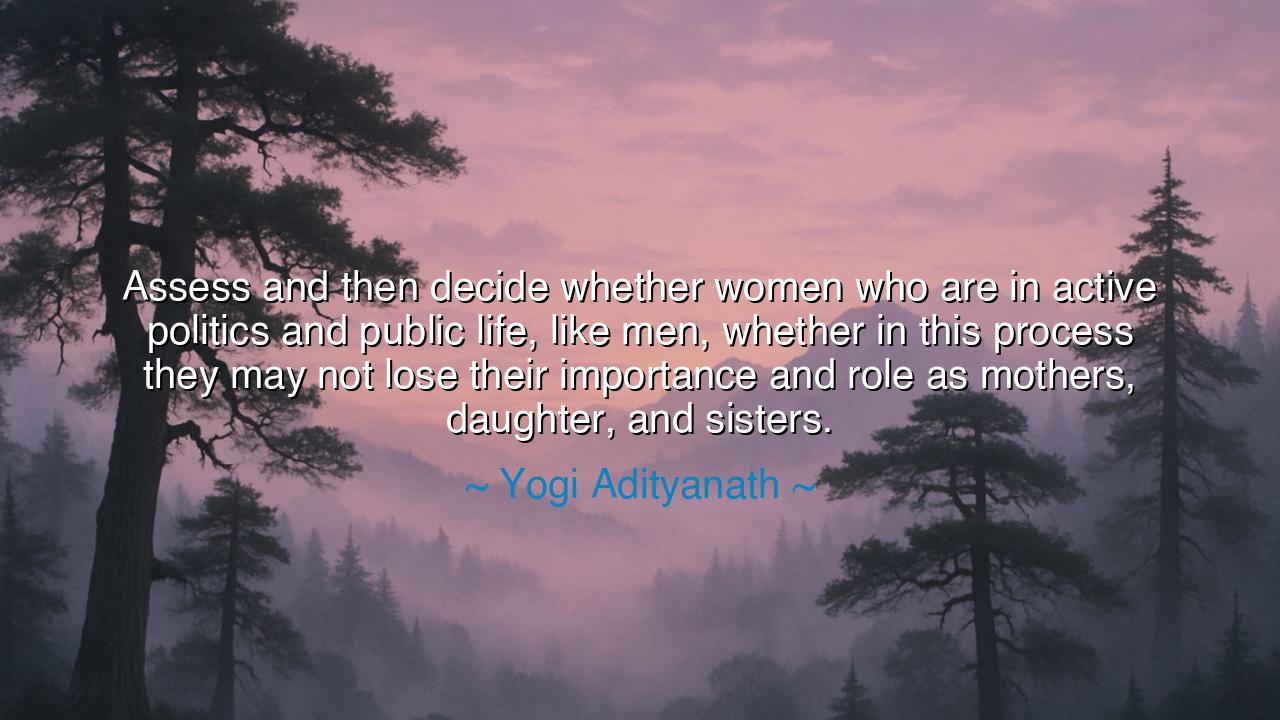
Assess and then decide whether women who are in active politics
Assess and then decide whether women who are in active politics and public life, like men, whether in this process they may not lose their importance and role as mothers, daughter, and sisters.






Hearken, children of reflection, and behold the words of Yogi Adityanath: “Assess and then decide whether women who are in active politics and public life, like men, whether in this process they may not lose their importance and role as mothers, daughter, and sisters.” In this utterance lies a meditation on the delicate balance between duty and identity, between the public sphere and the sacred circle of family. It warns that in the pursuit of power, ambition, and public recognition, one must not forget the enduring roles that form the bedrock of society and human connection. Wisdom, here, is measured not merely in achievement, but in the preservation of one’s essence.
The origin of this reflection springs from the discourse of contemporary India, where tradition and modernity intertwine, and where women increasingly step into realms of governance and public responsibility. Yogi Adityanath speaks as both observer and guardian of societal norms, urging caution that in embracing the mantle of public life, the sacred duties of family—the bonds to mother, daughter, and sister—remain honored and unbroken. His words are a mirror of ancient thought, recalling the sages who warned that personal ambition should never erode the ties that sustain the human heart.
Consider the life of Golda Meir, the indomitable Prime Minister of Israel. She rose to the heights of political power, guiding a nation through perilous times, yet her letters and diaries reveal the profound tension between public duty and personal roles. Though she wielded authority like the strongest of men, she remained ever conscious of her identity as a woman, a mother, and a sister to her people. Meir embodies the essence of Yogi’s caution: to navigate public life with strength tempered by attention to personal and familial bonds.
In the realm of history, countless examples illuminate this truth. Cleopatra, the Queen of the Nile, exercised unmatched political acumen and influence, yet her every act was entwined with her duties to family and lineage. In every decision, the roles of daughter, sister, and mother remained threads in the tapestry of her life, reminding all that power, however radiant, is hollow if it severs one from the sacred circle of kinship.
Even in our daily lives, this wisdom resonates. Women who pursue careers, leadership, or public service must weigh their responsibilities and relationships, ensuring that in their ascent, they do not forsake the love, care, and guidance that anchor the human soul. The balance is not a limitation but a measure of true wisdom and foresight, guiding the heart to act with both ambition and conscience.
Thus, children of future generations, heed this counsel: ambition need not oppose virtue, nor public service contradict family. Yet one must assess with clarity and decide with care, preserving the sacred roles that define humanity. In this vigilance lies the ancient teaching—that the strength of a society rests upon the harmony between its public deeds and the enduring values of family, love, and devotion.






AAdministratorAdministrator
Welcome, honored guests. Please leave a comment, we will respond soon